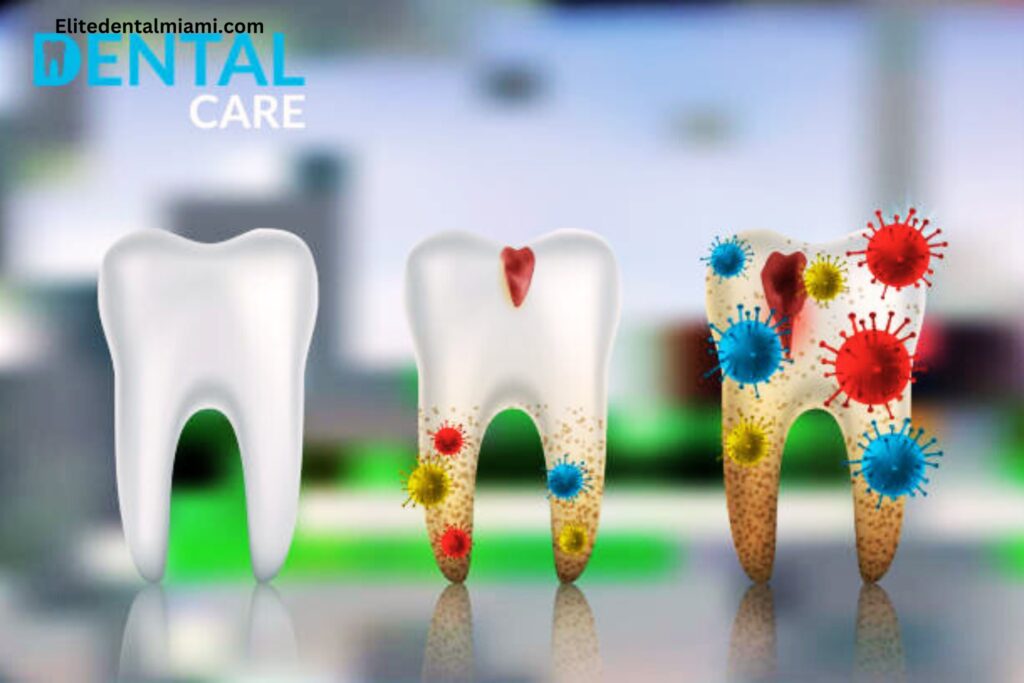Long-term side effects of tooth extraction may include permanent numbness or tingling in the affected area due to nerve injury, as well as potential complications such as crooked teeth, new gaps between teeth, and super-eruption of opposing teeth. Other late complications can include swelling and pain, dry socket, osteomyelitis, bleeding, and osteonecrosis of the jaw.
Dental extractions also come with risks such as pain, bleeding, bruising, swelling, and infection. Additionally, tooth extraction can lead to poor nutrition from difficulty chewing and improper teeth alignment. It is important to be aware of these potential long-term effects and discuss them with your dentist before undergoing a tooth extraction procedure.
Long-term Side Effects Of Tooth Extraction
Long-term side effects of tooth extraction are a rare but possible complication. One potential side effect is damage to the nerve that serves the tooth, which can cause permanent numbness or tingling in the area. Another long-term effect is the shifting of teeth.
Without the extracted tooth to provide support, neighboring teeth may become crooked or gaps may appear between teeth. Super-eruption is another issue that can occur, where the tooth opposing the missing tooth starts to grow out from its position. Complications after tooth extraction can also include swelling, pain, dry socket, osteomyelitis, bleeding, and osteonecrosis of the jaw.
It’s important to be aware of these potential long-term effects and seek prompt attention if any complications arise.
Jaw bone loss
Bone Loss in the Jaw: One of the long-term side effects of tooth extraction is bone loss in the jaw. When a tooth is extracted, it can lead to the loss of surrounding bone tissue. This occurs because the root of the tooth, which provides stimulation to the surrounding bone, is no longer there.
Without this stimulation, the bone in the jaw can begin to deteriorate over time. This can result in changes in the facial structure and can also impact the stability of neighboring teeth. To prevent or minimize bone loss after tooth extraction, dentists may recommend options such as dental implants or bone grafting procedures.
These treatments can help to preserve the health and integrity of the jaw bone, ensuring long-term oral health and function. It is important to discuss these options with your dentist to determine the best course of action for your specific situation.

Poor Nutrition From Difficulty Chewing
Poor Nutrition from Difficulty Chewing One of the long-term side effects of tooth extraction is poor nutrition. After undergoing a tooth extraction, it can become difficult to chew certain foods, especially if the extraction site is located near the front of the mouth or if multiple teeth have been removed.
This difficulty in chewing can lead to a limited diet, as individuals may avoid foods that require more chewing, such as raw vegetables or meats. As a result, they may not receive an adequate intake of essential nutrients, such as vitamins and minerals, which are important for overall health and well-being.
It is important for individuals who have undergone a tooth extraction to find alternative ways to obtain these nutrients, such as incorporating soft foods, smoothies, or nutritional supplements into their diet. Additionally, working with a dentist or nutritionist can help individuals create a balanced diet that meets their nutritional needs while accommodating any difficulties with chewing.
Chronic Pain From Misaligned Teeth
The long-term side effects of tooth extraction can include chronic pain from misaligned teeth. When a tooth is removed, it can lead to changes in the alignment of the surrounding teeth and jaw. Over time, this misalignment can cause chronic pain and discomfort in the affected area.
In some cases, the removal of a tooth can also result in numbness or tingling sensations due to nerve damage. Additionally, the absence of a tooth can cause adjacent teeth to shift or drift, creating gaps or crookedness in the smile.
Without the opposing force of the missing tooth, the tooth that opposes the extraction site may start to grow out of its position. It is important to be aware of these potential long-term effects and to seek appropriate dental care to address any issues that may arise from tooth extraction.

Emotional Effects Of Tooth Loss
The emotional effects of tooth loss can have a significant impact on individuals. Losing a tooth can lead to feelings of embarrassment and self-consciousness, especially if the missing tooth is visible when speaking or smiling. It can also affect an individual’s self-esteem, causing them to feel less confident in social situations.
Additionally, tooth loss can impact a person’s ability to eat certain foods, leading to dietary restrictions and potential nutritional deficiencies. Over time, these emotional and physical effects can have a negative impact on a person’s overall quality of life. It is important for individuals who have experienced tooth loss to seek appropriate dental care to address both the functional and emotional aspects of their oral health.
Swelling Of The Teeth Is Possible
After a tooth extraction, there is a possibility of swelling in the affected area. Swelling is a common side effect of tooth extraction and is typically a result of the body’s natural response to the procedure. The swelling usually occurs within the first few days after the extraction and may last for several days.
It is important to follow your dentist’s instructions to help reduce swelling, such as applying ice packs to the affected area and taking prescribed medications. Swelling can vary in severity depending on the complexity of the extraction and individual healing response.
In some cases, swelling may be accompanied by bruising and bleeding. If you experience excessive swelling, severe pain, or any other concerning symptoms, it is important to contact your dentist for further evaluation.
Sometimes Toothache Is Felt
Tooth extraction is a common dental procedure, but it’s important to be aware of the potential long-term side effects. In some cases, the extraction may result in injury to the nerve that serves the tooth. This can lead to a permanent numbness or tingling sensation in the area.
While this complication is rare, it can affect certain individuals. Additionally, tooth extraction can cause other issues such as teeth becoming crooked or new gaps appearing between teeth. Another possible complication is super-eruption, where the tooth opposing the site of the extracted tooth starts to grow out of position.
It’s essential to understand and discuss these potential long-term effects with your dentist before undergoing a tooth extraction.
Problems Occur While Dieting
Tooth extraction is a common dental procedure that may have long-term side effects. One potential complication is nerve injury, which can result in numbness or tingling in the affected area. While this is rare, it can impact some patients permanently.
Another issue that may arise after a tooth extraction is the shifting of teeth. Without the support of the extracted tooth, neighboring teeth may become crooked or new gaps may appear. In some cases, the opposing tooth may start to grow out of position, a condition known as super-eruption.
There are also late complications that can occur after a tooth extraction. These include swelling, pain, dry socket, osteomyelitis, bleeding, and osteonecrosis of the jaw. These complications require prompt attention from a dental professional. It’s important to note that tooth extraction, like any surgical procedure, carries risks.
Common risks include pain, bleeding, bruising, swelling, and infection. Patients should discuss these risks with their dentist before undergoing the procedure. Knowing the potential long-term side effects of tooth extraction can help patients make informed decisions about their dental health.
Regular dental check-ups and following post-extraction care instructions can help minimize these risks.
There Are Many Interruptions To Keep Your Face Fresh
The long-term side effects of tooth extraction can vary depending on the individual and the specific circumstances of the extraction. One possible side effect is nerve injury, which can result in the affected area feeling numb or tingly on a permanent basis.
While this is a rare complication, it can still occur for some patients. Another potential long-term effect is the development of crooked teeth or new gaps between teeth. This can happen if the missing tooth is not replaced, causing adjacent teeth to shift and create misalignment.
Additionally, a process called super-eruption may occur. This happens when the tooth opposite the extracted tooth starts to grow out from its position due to the absence of opposing resistance. Overall, it is important to be aware of these possible long-term side effects and seek appropriate dental care to mitigate their impact.

FAQs Of Long-term Side Effects Of Tooth Extraction
Does A Tooth Extraction Have Long Term Effects?
Tooth extraction may have rare long-term effects such as numbness or tingling due to nerve injury. Missing teeth can cause issues like crooked teeth or gaps. Complications after extraction include swelling, pain, dry socket, bleeding, and infection. Dental extractions have risks like pain, bleeding, bruising, swelling, and infection.
What Happens If You Have A Tooth Pulled And Don T Replace It?
Not replacing a tooth after extraction can lead to several long-term effects. Teeth may become crooked, and new gaps may appear between teeth. Another issue is super-eruption, where the opposing tooth starts to grow out of its position without the opposing tooth to resist it.
In some cases, there may be complications such as swelling, pain, dry socket, and infection. Dental extractions come with risks, including pain, bleeding, bruising, swelling, and infection.
What Are The Late Complications Of Tooth Extraction?
Late complications of tooth extraction include injury to the nerve that serves the tooth, resulting in numbness or tingling on a permanent basis. Other complications may include crooked teeth, gaps between teeth, and super-eruption of opposing teeth. Urgent complications can also occur, such as swelling, pain, dry socket, osteomyelitis, bleeding, and osteonecrosis of the jaw.
Dental extractions also carry risks such as pain, bleeding, bruising, swelling, and infection.
Is There Any Danger In Tooth Extraction?
Tooth extraction carries some risks, including pain, bleeding, bruising, swelling, and infection. Rarely, the nerve serving the tooth may be damaged, resulting in permanent numbness or tingling. Not replacing a missing tooth can also lead to issues such as crooked teeth and super-eruption.
Prompt attention is necessary for complications like swelling, dry socket, osteomyelitis, bleeding, and jaw osteonecrosis.
Can Tooth Extraction Cause Permanent Numbness?
Yes, in rare cases, tooth extraction can cause permanent numbness or tingling sensations due to nerve injury.
Conclusion
Tooth extraction may have long-term side effects that patients need to be aware of. One potential complication is nerve injury, which can result in permanent numbness or tingling in the extraction area. Other issues include teeth becoming crooked and the opposing tooth experiencing super-eruption.
Late complications can also arise, such as swelling, pain, dry socket, and osteonecrosis of the jaw. It’s important to discuss these risks with your dentist before undergoing the procedure. Overall, tooth extraction should be approached with caution to minimize any potential long-term effects.

I am a dentist and also blog regularly. my target audience is America Europe & providing regular information for them.
